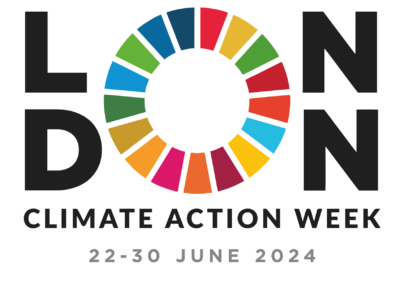Dr Tess O’Hara is a Lecturer in Engineering Hydrogeology at Newcastle University. In this blog, she reflects on discussions at COP28 with Baroness Barran, Parliamentary Under Secretary of State (Minister for the School System and Student Finance) and Professor Sir Steve Smith (UK Government’s International Education Champion) about climate change education in the UK.
8 December was Youth, Children, Education and Skills Day at COP28. The focus was on the education of young people, but some speakers reminded us that we never need to stop learning and that life-long education is essential as climate change is an evolving problem. At several talks I heard that “green skills” are in high demand and in the future all jobs will be “green jobs”, I took this to mean that climate change is a ubiquitous challenge that we must all tackle together.
I wanted to understand what climate change education is available in the UK, and to think about what more can be done. I attended panel discussions with Baroness Barran (Parliamentary Under Secretary of State (Minister for the School System and Student Finance) and Professor Sir Steve Smith (UK Government’s International Education Champion) who agreed to be interviewed.
Baroness Barran told me that climate change is specifically taught in geography, science and PHSE up to Key Stage 4 (GCSE level) and is woven into other subjects. Schools often have nature clubs or eco-councils as extra curricula activities, where climate change is a hot topic. I worked with one of these clubs and the level of engagement from the pupils was fantastic[1]. There is a new Natural History GCSE under development, that will give pupils the opportunity to learn more about the natural world[2], and some schools are offering A-Level Environmental Science. A new initiative is the National Education Nature Park[3] that helps pupils understand the value of the school grounds for biodiversity and sustainability. Teachers are sign posted to resources via the website, and further information will be available through Sustainability Leadership and Climate Action Plans in Education[4]. Baroness Barran was understandably positive about these new initiatives, although we discussed the varying levels of teacher confidence to deliver climate change education. The Higher Education sector could assist by offering support to local schools, by letting pupils know what further learning is available and what green skills they can develop. Contributions from climate experts to school clubs and talks from new students sharing their experiences are always welcome.
I asked Professor Sir Steve Smith to expand on the ways that HE providers can support climate change education. His role is to support the UK education system from early years through to PhD and staff mobility with a focus on five main countries; India, Indonesia, Saudi Arabia, Nigeria and Vietnam, as well as being the Prime Minister’s special representative to Saudi Arabia for education. I asked Sir Steve for some insight into climate change education demands globally:
How high on the agenda globally is climate change education?
The demand for green skills is enormous and is right at the front of government agendas.
What skills are in demand?
Industry knows what they need today (or yesterday) but not always what is needed in a year or two. Therefore, universities need to teach flexible skills and crucially how to work in a team. There can be tension between that and the expectations of a course, with core content seen as the gold standard. In my experience, getting students to move away from what they see as the core curriculum is difficult. But I am certain that the most employable students will be those who have disciplinary knowledge plus a series of soft/green skills.
Do you have any advice for researchers and lecturers starting out in academia to ensure their work reaches the right audience?
I think the key goal is to produce work that either addresses the core issues of your discipline (and these of course change with the times), or to focus on how you might contribute to the translational aspects of your research and/or develop pedagogy that equips students with the skills they are going to need. A variety of routes to engagement are required, and universities are becoming more adept at ensuring impact from teaching and research.
In the midst of changing the way we do things it can seem that progress is slow, but by mainstreaming climate change into the curriculum and being alert to the evolving green skill demands we can continue to improve our response to climate change. There is clearly a role for the HE sector to continue critical research, but to also ensure that the science is communicated to successive generations so they are equipped for the challenges they will face in the future. At Newcastle University we are developing our “Weather Academy” with industry to co-design Continuing Professional Development (CPD) on topics including environmental data use, climate change leadership and the fundamentals of climate change. Hopefully COP28 and the ongoing initiatives outlined here mean we will reach the critical mass needed to make all jobs green and have widespread green skills so addressing climate change becomes commonplace.
About the author
I lecture on water resource management and conduct research on extreme rainfall and citizen science. I work with industry to develop CPD training relating to climate change. I am always interested to hear from anyone who thinks what I do could be useful – please get in touch: tessa.o’hara@ncl.ac.uk.
References
[1] https://www.mdpi.com/2071-1050/15/12/9401
[2] sustainability – The Education Hub (blog.gov.uk)
[3] Home | Education Nature Park
[4] Sustainability leadership and climate action plans in education – GOV.UK (www.gov.uk)
Tess O’Hara was awarded a Networking Scholarship to attend COP28, enabled by a partnership between the UK Universities Climate Network, the UK Embassy Science and Innovation Network in UAE and the Research England funded Centre for Postdoctoral Research in Infrastructure, Cities and Energy (C-DICE).


